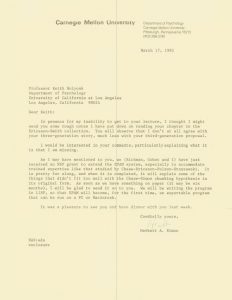
(click for full letter with notes)
Background
Early in 1992, I gave a talk in the Psychology Department of Carnegie Mellon University. During this visit I had dinner with a few faculty members, including Herbert Simon (recipient of the 1978 Nobel Prize in Economics). I had first met Herb in 1976 when I was about to get my PhD, and interviewed (unsuccessfully) for a faculty position at CMU. During the dinner in 1992 I recall that Herb regaled us with stories about the 1960 election in which Kennedy defeated Nixon (with help from Chicago Mayor Richard Daley, suspected of having tampered with the vote to deliver the state of Illinois for the Democrat). I don’t remember much discussion of scientific matters.
A few months earlier a chapter of mine had been published, “Symbolic connectionism: Toward third-generation theories of expertise” (in A. Ericsson & J. Smith, eds., Cambridge University Press, 1991). Simon had been a pioneer in developing theories of human problem solving, both in what I called the first generation (general heuristics that can be applied to a broad range of novel-lean problems), and the second (knowledge-rich procedures specialized for particular domains, implemented as expert systems in AI and production systems in cognitive science). I believe I coined the term “symbolic connectionism” for my chapter, referring to the general idea of integrating symbolic representations with neural networks (a line of thinking triggered in part by a one-session seminar on “Productions Systems and Parallel Distributed Processing” held at CMU in 1985; see entry in Archives). In my chapter I argued that the first two generations of theories of expertise had not been altogether successful in accounting for human problem solving, and that it might be worth exploring new approaches. Shortly after my visit to Pittsburgh, I received a friendly letter from Herb, accompanied by a 3 page rebuttal of pretty much every point I had raised in my chapter. I recall I was caught between feeling flattered to receive such personal attention from the great man, and feeling dismayed to be the focus of his unsparing critique. I don’t remember what I wrote back in reply, but am quite sure I kept it brief and humble. Re-reading Simon’s correspondence now, it seems like an example of (one side) of a genuine intellectual argument—an expression of considered disagreement that never gets personal. And of course, a rare example
from early in the email era) of what an old-school physical letter looked like.
—Keith Holyoak (4/30/2018)